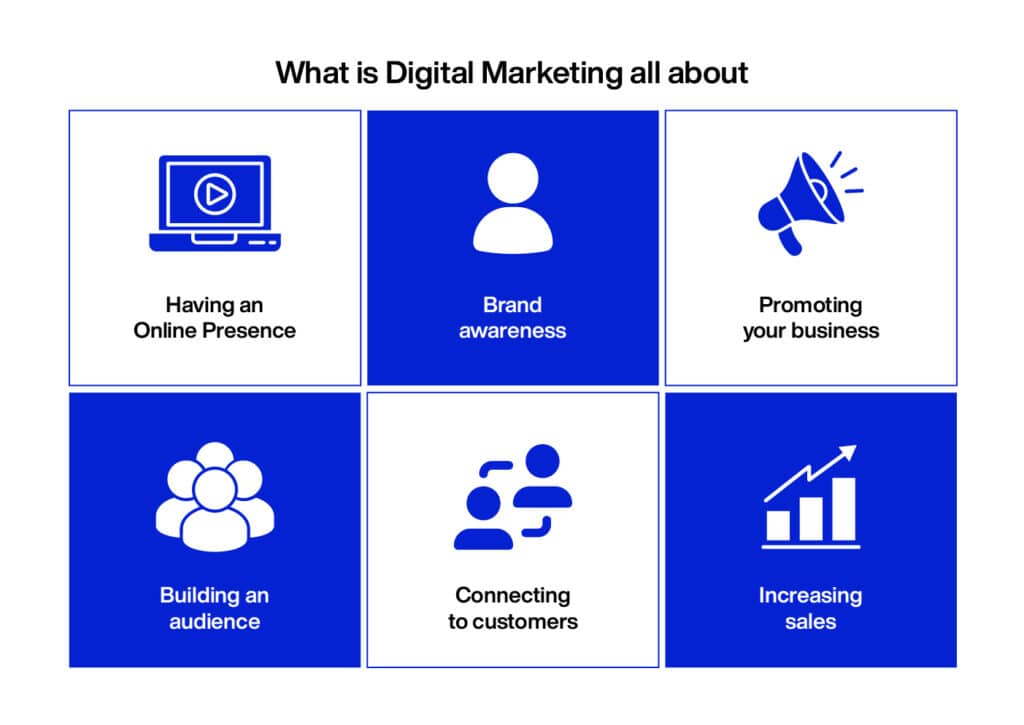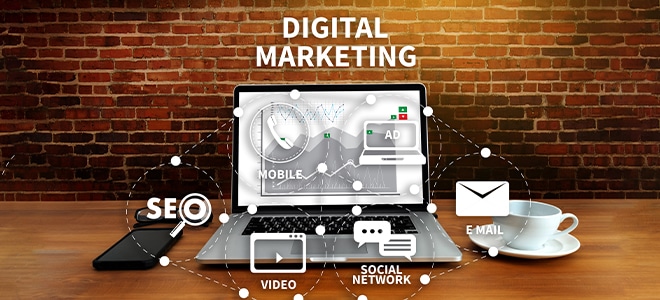Listen to this blog
Digital marketing is the most common type of marketing in the age of rapid technological development. It drives business expansion and enables businesses to locate new clients, build their reputation, and promote or sell their brand. It involves connecting with target markets using various internet marketing platforms like social media, email, and search engines.
The global market for digital marketing and advertising is projected to grow to $786.2 billion by 2026. This industry offers various job opportunities, ranging from analytical and technical to creative and strategic. This blog will discuss the rise in demand for digital marketing professionals, digital marketing success stories, effective digital marketing tactics, best practices in digital marketing, and more in detail.

Rise in demand for digital marketing professionals
The expanding digital marketing space requires an increased number of digital marketing (DM) professionals. Let’s explore the reasons for the rise in demand for digital marketing professionals:
- Technological developments such as data analytics and artificial intelligence have revolutionized digital marketing, requiring experts to create creative and effective marketing plans.
- Digital marketing has enabled businesses to reach a global audience, creating an increasing need for experts who can handle a range of consumer behaviors and international trends.
- In the competitive digital market, businesses require a robust online presence, necessitating skilled digital marketers to devise engaging tactics for their target audience.
7 C’s of Digital Marketing
Understanding and catering to the 7 C’s of digital marketing helps businesses master digital marketing. Let’s explore these essential elements:
1. Content
Content is the foundation of digital marketing, as it defines your goals and the message you wish to deliver. Furthermore, high-quality content increases click-through rates and can improve a website’s search engine ranking. Thus, if you wish to become a master in digital marketing, your content should be unique and engaging.
How to implement it: Conduct thorough research, develop a content strategy, create high-quality content, consistently publish and promote it across digital channels, and monitor its performance based on audience feedback.
2. Context
Understanding the context of your audience’s engagement with your brand is crucial, considering demographics, hobbies, online habits, and platform preferences.
How to implement it: Segment your audience, tailor messaging, use data analytics, and stay informed about industry trends to deliver personalized experiences.
3. Connection
It’s impossible to build trust in your brand unless you establish a connection with your target audience.
How to implement it: Implement omnichannel marketing strategies, engage with customers proactively through social media, live chat, email, and other channels, and use CRM software to manage and nurture customer relationships.
4. Community
A strong sense of community enhances brand advocacy, word-of-mouth marketing, and consumer loyalty.
How to implement it: Interactive content platforms, online forums, and social media groups are effective means of enhancing your community.
5. Customization
Customization is the process of creating offerings, experiences, and marketing messages unique to each customer, depending on their choices and actions. By providing tailored goods, recommendations, and content, customization helps improve customer satisfaction and increase conversions.
How to implement it: Utilize data-driven insights to segment your audience and tailor marketing messages. Utilize marketing automation tools for targeted campaigns and retargeting ads.
6. Communication
Marketers can increase brand loyalty and foster connections by utilizing clear communication tactics.
How to implement it: Maintain open communication with your audience through various channels, promptly address customer feedback, and effectively and cohesively convey your brand’s message and values through storytelling and visual elements.
7. Conversion
Conversion is the last ‘C’ and the ultimate goal of digital marketing. Conversions may improve your website’s performance and increase revenue generation.
How to implement it: To optimize your digital marketing efforts, set clear conversion goals for each stage of the customer journey, use conversion optimization techniques like A/B testing, and offer incentives to encourage action.
Also read: Future of digital marketing is as awesome as you can think
Digital marketing case studies
Digital marketing is prevalent in most traditional and modern businesses today. Let’s go over a few case studies in digital marketing:
1. Red Bull
Red Bull has made content marketing an essential component of its brand, creating top-notch articles, videos, and events centered on extreme sports and high-adrenaline activities. Through its digital marketing, Red Bull has effectively built a devoted following and positioned itself as a lifestyle brand.
2. Growth Machine
In eight months, a new tea blog initiative by Growth Machine’s founder, Nat Eliason, generated 150,000 organic monthly visits. He organized data into a spreadsheet and released excellent information on the subject at a frequency of four blog entries every week for eight months. He used Facebook groups, Pinterest, and Reddit to advertise the content and increase visitors.
3. BuzzSumo
BuzzSumo, a content marketing tool, experienced a yearly revenue gain of $2.5 million in its first year. The tool generated significant advocacy and support from prominent figures like Larry Kim, Rand Fishkin, and Neil Patel. BuzzSumo aimed to lower churn rates and make the product memorable, producing original content based on data.
4. Peet’s Coffee
Peet’s Coffee has improved its Google Ads strategy by revamping its ad language and approach. It now focuses on high-ROI and non-branded keywords to highlight its unique value proposition. This strategy resulted in a 158% increase in ROAS, a 72% decrease in cost per order, a 455% revenue gain, and 676% more orders.
5. Spotify
Spotify’s personalized approach, focusing on music discovery, differentiates it from competitors. It developed an algorithm to offer personalized playlists based on user activity and interests, thereby increasing its reach and brand recognition.
6. Coca-Cola
Coca-Cola launched the “Share a Coke” campaign, featuring popular names and slogans on bottles instead of the company’s logo. Customers were encouraged to find bottles with their names or friends’ names and share them on social media. Coca-Cola also created a website for personalized bottles and user-generated content, leading to improved sales and loyalty.
7. Airbnb
Airbnb launched the “Live There” campaign to encourage travelers to experience local experiences. The campaign, utilizing social media, showcased unique experiences at Airbnb properties. The campaign’s widespread buzz and brand recognition led to a significant increase in bookings and revenue for Airbnb.
Digital Marketing Best Practices for 2024
Are you caught up with how digital marketing can have a big impact on your business’s online standing and revenues? Let’s explore some key best practices for digital marketing.
1. Personalization
Personalization can encourage users to do certain actions, such as buying something, subscribing to a newsletter, or filling out a form. Delivering personalized content improves the user experience and raises interest, interaction, and conversion rates.
2. Voice Search Optimization
The rise of speech-activated devices like smart speakers and virtual assistants (like Alexa and Siri) has led to a significant increase in voice search usage. Businesses must adapt to this shift in customer behavior to remain visible and relevant.
3. Virtual Reality (VR) and Augmented Reality (AR)
Use augmented reality (AR) glasses, filters, and virtual try-on tools to provide immersive product demos and brand experiences and increase user engagement.
4. Influencer Marketing
Work with micro and nano influencers with specialized audiences and strong interaction rates. Rather than concentrating on one-time efforts, concentrate on developing enduring connections with influencers who share your company values.
5. Social Media
Use social media sites as sales channels and integrate them into your e-commerce plan. Moreover, it is advised to use traditional or contemporary social media sites for marketing purposes, depending on your target audience.
6. AI and Automation
Automate tasks whenever possible to save time and effort. This includes using AI chatbots to answer consumer inquiries, referring to AI-generated analytical reports, and triggering emails to website visitors.
7. Data Privacy and Compliance
Prioritize data privacy and compliance with regulations such as GDPR, CCPA, and other emerging privacy laws. Obtain full consent for data collection and processing and ensure transparency in how customer data is used.
8. Video Marketing
TikTok, Facebook, Instagram, Snapchat, and Twitter are a few social media sites that can be good sources of video traffic. Invest in video content as well to engage viewers and increase conversions.
Take your marketing career digital with Online Manipal
Manipal University Jaipur, a reputable and well-established university, offers a comprehensive MBA program with a Marketing specialization.
- The MBA program at MUJ is industry-relevant and covers a wide range of topics to incorporate the latest trends, tools, and practices.
- MUJ has collaborations with leading companies that provide students with opportunities for internships, live projects, and more, enhancing their practical exposure and employability.
- The university has a track record of high placement rates, ensuring promising career prospects for MBA graduates.
Conclusion
Digital marketing is an essential part of almost any company’s marketing mix. Several digital marketing strategies, including SEO, PPC advertising, email marketing, social media marketing, and content marketing, offer outstanding return on investment possibilities. By implementing these strategies, studying successful case studies, and following best practices in digital marketing, you can create effective digital marketing campaigns that drive engagement, conversions, and business growth.
Key Takeaways:
- Digital marketing allows you to identify potential customers, connect with them, establish credibility with your company, and eventually market or sell your brand.
- With the rise in digital marketing, the need for experts in the field has also increased.
Prepare for your next career milestone with us












